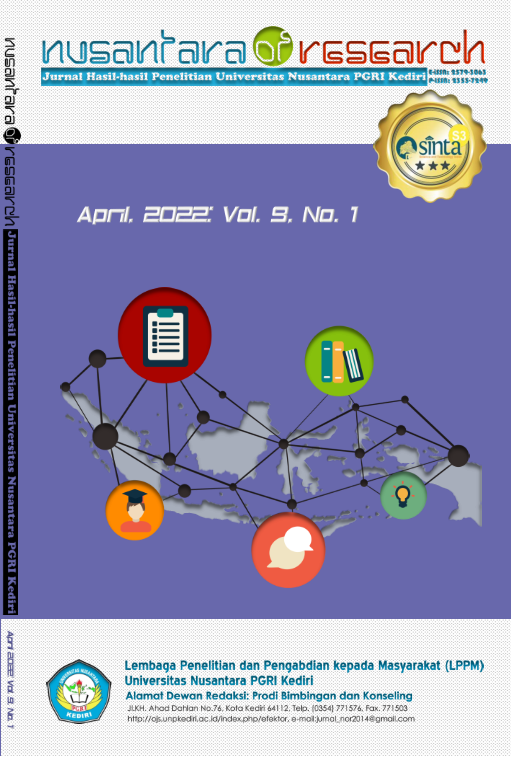Skala Kematangan Karier Siswa SMK
Isi Artikel Utama
Abstrak
Hasil studi pendahuluan menemukan bahwa kematangan karir siswa SMK tergolong rendah, antara lain a) siswa tidak memiliki rencana untuk kelanjutan karier setelah lulus sekolah, b) siswa tidak memiliki usaha untuk mencari informasi jurusan karier yang dipilih, c) siswa tidak tertarik membaca informasi tentang karier yang telah dipajang, dan d) siswa kesulitan memutuskan mau kemana dan apa yang harus dikerjakan ketika lulus sekolah. Peneliti perlu berupaya untuk meningkatkan kematangan karier siswa SMK. Untuk mengukur peningkatan kematangan karier dalam upaya tersebut, peneliti mengembangkan instrumen berupa skala kematangan karier siswa SMK yang valid dan reliabel. Oleh karena itu, artikel ini memaparkan uji validitas dan reliabilitas skala kematangan karier siswa SMK yang telah dikembangkan sendiri oleh peneliti. Berdasarkan hasil uji validitas yang ditelah diberikan kepada 139 siswa kelas XI SMK Pemuda Papar, diperoleh 55 item skala yang valid dengan t tabel sebesar 0.166 dan tingkat reliabel sebesar 0.892. Dari 55 aitem valid, semua mewakili setiap indikator kematangan karier. Berdasarkan uji validitas dan reliabilitas instrumen, maka skala kematangan karier dapat digunakan untuk mengukur tigkat kematangan karier siswa SMK Pemuda Papar pada tahap penelitian selanjutnya.
##plugins.generic.usageStats.downloads##
Rincian Artikel
Authors who publish with this journal agree to the following terms:
- Copyright on any article is retained by the author(s).
- The author grants the journal, the right of first publication with the work simultaneously licensed under a Creative Commons Attribution License that allows others to share the work with an acknowledgment of the work’s authorship and initial publication in this journal.
- Authors are able to enter into separate, additional contractual arrangements for the non-exclusive distribution of the journal’s published version of the work (e.g., post it to an institutional repository or publish it in a book), with an acknowledgment of its initial publication in this journal.
- Authors are permitted and encouraged to post their work online (e.g., in institutional repositories or on their website) prior to and during the submission process, as it can lead to productive exchanges, as well as earlier and greater citation of published work.
- The article and any associated published material is distributed under the Creative Commons Attribution-ShareAlike 4.0 International License
Referensi
Borg, W.R & Gall, M.D. 1983. Educational Research an Introduction with Plain. New York: McGaw Hill.
Crites, J. O. 1981. Career Counseling: Models, Method, and Materials. New York: McGraw Hill.
Dillard, J. M. 1985. Life Long Career Planning. Ohio: A Bell & Howell Company.
Febriyanti, Citra. 2016. Pengembangan Skala Pengukuran Perilaku Pro Lingkungan: General Ecological Behavior (GEB) Scale. JP3I. 5(2), 153-182.
Hamzah, Amir. 2019. Kematangan Karier Teori dan Pengukurannya. Batu: Literasi Nusantara.
Healy, Ch. C. (1982). Career Gaidance Through the Life Stages. Los Angeles: Allyn and Bacon, Inc.
Nunnaly, J.C. (1981). Psychometric Theory (2nd edition). New York: McGraw-Hill Publishing Company.
Savickas, M.L. (1999). The Transition from School to Work: A Developmental Perspective. The Career Development Quartely. 4, 326-336.
Sinamora, Henry. 2006. Manajemen Sumber Daya Manusia. Yogyakarta: STIE YKPN.
Suharman. 2012. Pengembangan Skala Kemandirian. Jurnal Psikologi Indonesia. 1(2), 66-76.
Suryabrata, S. (2005). Pengembangan Alat Ukur Psikologis. Yogyakarta: Penerbit Andi.
Wijaya, F. (2008). Hubungan antara Kematangan Karir dengan Motivasi Belajar pada Siswa Kelas X MAN Cibinong. Skripsi. Tidak Dipublikasikan. Jakarta: Gunadarma.
Zulkaida, A., dkk. 2007. Pengaruh Locus of Control dan Efikasi Diri terhadap Kematangan Karir Siswa Sekolah Menengah Atas (SMA). Proceeding PESAT, Agustus 21-22 2007. Jakarta Barat: Auditorium Kampus Gunadarma.
